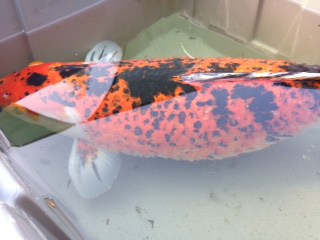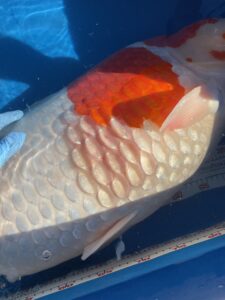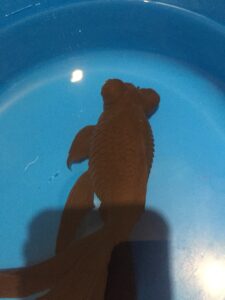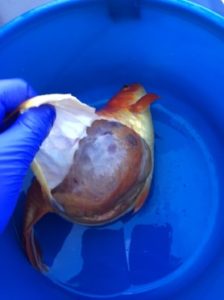“Dropsy” is a common internet diagnosis in pet fish. Describing the condition of a fish with a “pinecone”-like appearance, with a swollen belly and protruding scales, “dropsy” isn’t actually a disease at all! This condition is simply a symptom of many various conditions in freshwater fish. A fish with dropsy is an indication that their gills and/or kidneys are not working properly, which can be caused by many different fish issues, including bacterial infections, viruses, diet, cancer and even poor water quality!

Many fish die from dropsy simply because it is not correctly diagnosed. Before you dump a bunch of OTC “antibiotics” on your fish, it is critical that you get the correct diagnosis of the cause of “dropsy” in order to get them back to health as fast as possible.
What is “dropsy?”
Well, to start off, “dropsy” is NOT a disease. Dropsy in fish describes a condition where a fish’s body balloons outward and their scales start to stick out, looking like a pinecone. This syndrome is caused by excess water in the body cavity or coelom. Excess water collects in the skin between the scales and around the internal organs causing the traditional “dropsy” appearance. Dropsy can occur in all freshwater fish, including koi, goldfish, guppies and bettas.
Dropsy in fish is a presentation that indicates poor kidney and/or gill function and can be caused by many varied disease processes. Freshwater fish live in an environment that is less dense than their bodies. Through passive diffusion, water is constantly trying to even out the fish’s density by pulling water into the body tissues, mainly the skin and gills. A freshwater fish’s kidneys and gills work very hard to remove excess water and pass it back out into the environment with other waste.
If either of these organs are not functioning correctly, water is not removed effectively and the fish starts taking on water. This can supersaturate all their tissues, leading to full organ failure if nothing is done or the improper treatment is administered. Early detection, diagnosis and treatment is the best chance of your fish making a full recovery.

What causes dropsy?
Many different disease processes can cause this syndrome, including stress from poor water quality, inadequate diet, tankmate aggression, tumors, parasites, viruses and bacteria. “Dropsy,” or more clinically edema, is simply a sign that there is something wrong affecting the kidneys and not a specific disease process. Chronic stress from many issues causes a decrease in immune function, allowing for secondary environmental infections.
How can I treat dropsy?
When your fish takes on this appearance, don’t assume it will be corrected by dumping in antibiotics. Not only is this harmful to your fish, but it gives owners unnecessary exposure to the drugs as well. Not to mention that all OTC fish meds are not controlled or evaluated in ANY way. Start by checking your water parameters, evaluating your fish’s diet and making sure no on is picking on them. If you do not find a clear cause, contact your local fish veterinarian.
Your aquatic veterinarian will run a full diagnostic panel and give your fish a thorough physical exam, sometimes with imaging, in order to come up with a differential list of potential causes. Many times, it is critical to treat not only the secondary issues, but the primary cause.

Why bother treating dropsy if it has such a poor prognosis?
There is another common assumption that dropsy is a death sentence. This is ABSOLUTELY NOT the case! Many fish with dropsy perish because they do not receive proper treatment. If caught early enough with a correct diagnosis and clear treatment plan, many fish with dropsy will make FULL recoveries!
Looking for more fish disease FACTS and read all about our fake fish disease files? Check out our articles on “constipation” in fish, fin rot and stringy white poop. (HINT: None of them are actual diseases!)


Pingback: A “Typical” Day in the Life of a Fish Vet – Aquatic Veterinary Services
Pingback: Top 10 Mistakes New Fish Owners Make – #3 – Aquatic Veterinary Services
Pingback: Salt in Fish Tanks and Ponds - Aquatic Veterinary Services
Pingback: White Stringy Poop in Fish - Aquatic Veterinary Services
Pingback: Your Goldfish is NOT Constipated - Aquatic Veterinary Services
Hi!
I am Maria from Hungary.
I am a human medical doctor & a crazy obsessed aquarist 🙂
I am the administrator of the alphabet facebook group for aquaristics (Akvarisztika ABC), where more than 6,500 aquarists have gathered. Since I am editing the group’s website, I consider it my profession to write a reality about aquatic animal diseases on the website rather than a legend.
It is OK, that the dropsy is a kidney or gill disease, but: what can I do, what can we do with the fish patient?
I think we should isolate it first in a hospital aquarium. But what happens next? Disinfectants and good water quality? Vitamins? Obsession…?
(Not antibiotics, that is clear).
There is only one group of aquatic animals in Hungary (Vet4Fish). They are too busy to answer my questions.
I really like your website, I learned a lot from your articles and videos.
Please help! What should an aquarist do if he develops ascites (dropsy) in fish but no aquatic healer is available?
Thanks for everything!
Best regards: Maria from Hungary
This is my aquarist website aquatic animal medicine part
https://akvarisztika-abc.gportal.hu/gindex.php?pg=37444979
Since kidney and gill issues have very many causes, there is no one effective treatment. You may want to look into wavma.org for more aquatic veterinarians in your area.
Unfortunately, this is a small country in Europe with a total of 3 fish doctors, they are the Vet4Fish. (They are fantastic anyway!)
In this case, however, the only solution at the end of the article is for the aquarist to consult a fish veterinarian after examining and improving the water parameters and nutrition.
That’s so fair, isn’t it?
I don’t want another legend, I want to give correct information to Hungarian aquarists.
Thank you for your reply and for your time!
I have a 2.5ft tank with max 5 gold fishes. The newbie, One after another will get dropsy after few months, and died. Now I left 2 small goldfish which with me only 3months. Supposed to have 3 but 1 died due to bloated stomach and developed driopsy.
I am clueless what went wrong. I changed water every week. PH is 6—7. No overfeeding and interchange w sinking pellet n peas. The tank equipeddwith sump system and heater at 26degree.
Hope you can offer advice areas that I may overlook
If you are concerned about your fish, please call (831) 278-1081 for veterinary assistance. If you are outside California and Nevada, please visit https://fishvets.org or https://wavma.org
Pingback: Betta Fish Behavior Before Death: Understanding the Signs
Pingback: Betta Fish Tumor: Symptome, Ursachen und Behandlung – Aquarium Arc
Pingback: Understanding And Addressing Angelfish Bloat: Symptoms, Treatment, And Prevention Strategies For A Healthy Aquarium Environment - Aquarium Fish Source
Pingback: Goldfish Lifespan and Stages of Development – My Blog